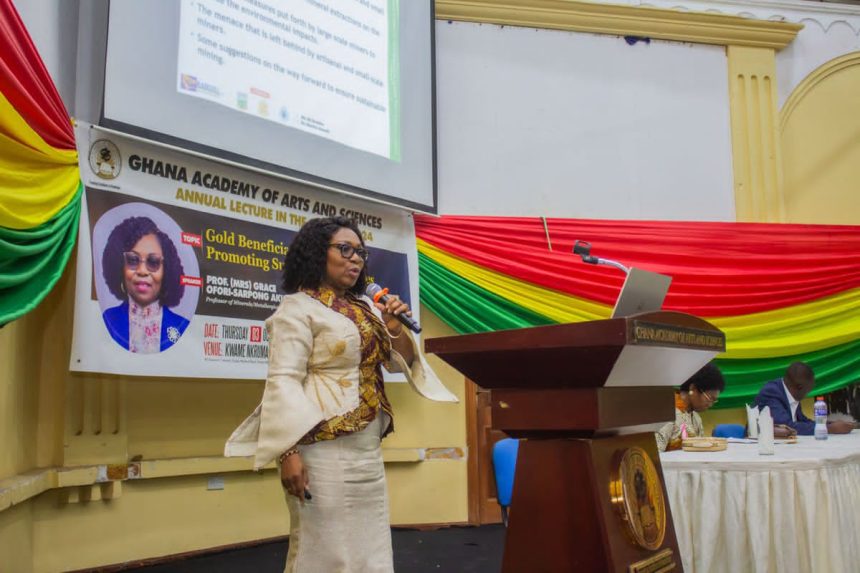Professor of Minerals Engineering, and currently the Dean of School of Postgraduate Studies at the University of Mines and Technology (UMaT), Professor Grace Ofori-Sarpong Akuffo, has called for well-resourced geological exploration and the extension of the Reclamation Bond to small-scale mining operations in Ghana.
Her recommendations aim to address the ongoing challenges posed by illegal mining, locally referred to as “galamsey,” while promoting sustainable practices within the mining sector.
Speaking at the Ghana Academy of Arts and Sciences after delivering her lecture on “Gold Beneficiation in Ghana: Promoting Sustainable Practices.”
Professor Sarpong emphasized the need for enhanced funding for Ghana’s Geological Survey Authority (GSA).
She highlighted that the GSA’s mandate includes delineating mineable lands, but financial constraints significantly hinder its ability to conduct necessary geological explorations.
Despite the availability of technical expertise at institutions like the University of Mines and Technology (UMaT), inadequate funding prevents comprehensive geological surveys from being carried out.
“Exploration is extremely expensive. The Geological Survey and even UMaT have the technical knowledge, but not the financial resources to implement it.”
In response to calls for a total ban on small-scale mining, Professor Sarpong argued that while some miners engage in destructive practices, many others are adopting responsible methods.
She asserted that small-scale miners could significantly enhance their operations with better access to technical expertise and resources.
Unfortunately, due to financial limitations, many small-scale miners hire untrained local workers, contributing to inefficiencies and environmental degradation.
“I have visited some small-scale miners who are doing it right, but their operations cannot match the standards of large-scale companies due to the disparity in capital and resources.”
Professor Sarpong urged for careful planning and dialogue before implementing any nationwide ban, advocating for a clear plan with measurable outcomes to ensure success.
“If there is to be a ban, it should be preceded by discussions, reasoning together and considering the expectations of the ban.”
Additionally, she proposed extending the Reclamation Bond, typically a financial guarantee required of large-scale mining companies to small-scale mining operations.
This measure would hold small-scale miners accountable for land restoration, encouraging more targeted and efficient mining practices that minimize environmental degradation.
Professor Sarpong emphasized the importance of responsible mining techniques, such as using tailings dams to manage mining waste and implementing water recycling systems.
According to her, by promoting more sustainable and responsible practices among small-scale miners, Professor Sarpong believes that Ghana can protect its environment while ensuring that mining remains a profitable venture for all involved
–
Story by: Akpalu Edmond Deladem | univers.ug.edu.gh





